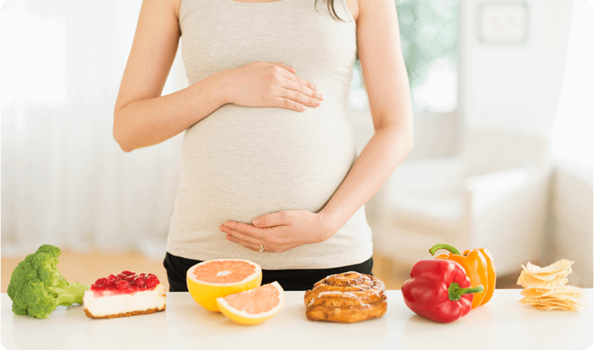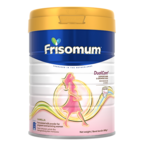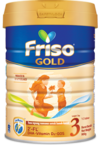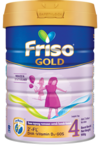Apakah Makanan Yang Sesuai Untuk Ibu Hamil?
Mengandung adalah pengalaman yang indah, tetapi apabila anda mula berg.... read more

The glycaemic index (GI) is a rating system that shows how quickly foods containing carbohydrates affect your blood sugar levels when the food is eaten on its own. The higher the GI rating, the faster and easier the carbohydrate food is broken down by your body, and this reaction is what causes a rapid spike in blood glucose1. The glycaemic index scores can be classified as below2:
However, not all high GI foods are unhealthy and vice versa. There are several factors that may affect how fast a food raises blood sugar levels such as2:
A higher glycaemic index could result in additional weight gain during pregnancy and a large for-gestational-age pregnancy which may also cause some complications during delivery3,6. Additionally, the risk of developing gestational diabetes increases if your diet is rich in unhealthy, high GI foods such as those that are high in sugar and fat4,5. A mother’s diet during her pregnancy can also ‘programme’ her child’s metabolism, with a poor pregnancy diet causing the child to be predisposed to becoming obese or developing type 2 diabetes when they are older3,6.
Low GI foods are absorbed more slowly and they lead to a gradual increase in blood glucose, which may help to control your appetite and weight gain. Generally, eating foods that score low on the GI7 can keep blood sugar levels steady and help you feel fuller for longer, giving you sustained energy — especially when you’re pregnant. A low GI diet will also help reduce the risk of developing gestational diabetes.
A healthy low GI diet is generally rich in complex carbohydrates such as whole grains and vegetables, high in lean protein and healthy fats, and low in processed, sugary snacks. Aside from lean protein such as fish, chicken, tofu, and eggs, you should also include non-starchy vegetables, nuts, high fibre legumes and pulses, grains, and fresh fruits into your diet,7,8,9. Although most dairy products such as milk and low-fat plain yoghurt contain natural sugars, research shows that it’s still recommended to include them as part of a balanced diet8.
Choose whole grain versions of carbohydrate foods such as pasta, rice, and crackers as the less processed the food is, the more likely it is to have a low GI score8. It’s also advisable to avoid snacking on sugary treats or foods made from white flour like biscuits, cookies, ice cream, instant noodles, chips, and instant breakfast cereals such as cornflakes.

Although a nutritious diet will provide you with most of the vitamins and minerals you need, it’s also a good idea to take some additional forms of nutrition and supplements to ensure that your child has the necessary nutrition he or she needs.
To address the specific needs of mums-to-be, maternal milk is often recommended as it helps balance both your and your child’s nutritional needs safely. We have formulated Frisomum® Gold with both mum and child in mind, and its unique Dual Care+ formula supports you on your pregnancy journey.
Containing vitamin B12, folic acid, iodine, vitamin D, DHA, calcium, choline, prebiotic and probiotic, magnesium and vitamin B complex, Frisomum® Gold milk is ideal for pregnant mums as it can support your body’s changing nutritional needs and provide a strong foundation for your child. Frisomum® Gold milk not only consists of essential nutrients which are formulated with DualCare+™, to support mums and their children's daily needs, but it also has a low GI score which can help to control blood glucose levels, making it an ideal snack for pregnant women.
From your mum to your friends, you’ll hear countless dos and don’ts during your pregnancy, making it difficult to separate the wheat from the chaff. However, when you consider pregnancy milk powder, it is essential to consider the origins of the milk, the process of manufacturing, and nutrient content as well as one which helps you control weight gain during pregnancy. Frisomum® Gold preserves the natural nutrients of the milk to give you what you need in your pregnancy journey. Now that you are aware of the importance of maternal milk/susu, check out what Frisomum® Gold has to offer now! Stick to these simple guidelines and, most of all, enjoy this magical time in your life.
References
1) https://www.nhs.uk/common-health-questions/food-and-diet/what-is-the-glycaemic-index-gi/
2) https://www.medicalnewstoday.com/articles/high-glycemic-index-foods#definition
3) https://www.ncbi.nlm.nih.gov/pmc/articles/PMC3022194/
4) https://www.gisymbol.com/gi-and-pregnancy/
5) https://www.clinicalnutritionjournal.com/article/S0261-5614(21)00188-6/fulltext
7) https://www.bbcgoodfood.com/howto/guide/spotlight-low-gi
9) https://www.medicalnewstoday.com/articles/319716#foods-to-avoid


